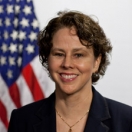
Today is the 50th anniversary of Medicare and Medicaid. On this day in 1965, President Lyndon Johnson said:
No longer will older Americans be denied the healing miracle of modern medicine. No longer will illness crush and destroy the savings that they have so carefully put away over a lifetime so that they might enjoy dignity in their later years. No longer will young families see their own incomes, and their own hopes, eaten away simply because they are carrying out their deep moral obligations to their parents, and to their uncles, and their aunts.
Today is a day to celebrate all that these programs have done to improve the lives of millions of Americans.
It is also a day to celebrate the ongoing efforts to strengthen these health programs, as well as to build on them by bringing affordable, quality health coverage to all Americans. The passage and implementation of the Affordable Care Act is another important step in this journey. The five years since this law passed have brought a dramatic expansion in health insurance coverage that has driven the uninsured rate to its lowest level ever; historically slow growth in health care costs; and striking improvements in the quality of patient care.
Just in the last week, we have seen further evidence that the law is working and improving health care in America, including:
- Helping extend the life of the Medicare Trust Fund by 13 years and reducing its actuarial deficit by more than four-fifths since 2009 (Medicare Trustees Report, 7/22).
- The highest Medicaid enrollment ever, with 0.5 million more people enrolled in May than April 2015, and 12.8 million more people enrolled in May than in October to July 2013 (CMS, 7/28).
-
Significant improvements in health and financial security for those gaining coverage:
-
Nationwide, relative to trends before the Affordable Care Act, the proportion of people who:
- Lack a personal physician is down 3.5 percentage points, which translates to 7 million adults gaining access to a personal physician;
- Lack easy access to medicine is down 2.4 percentage points, meaning 4.8 million adults gained easy access to medicine they needed;
- Are unable to afford care is down 5.5 percentage points, which correlates to 11 million more adults being able to afford health care;
- Report fair/poor health is down 3.4 percentage points, which corresponds to 6.8 million more adults describing themselves as being in excellent, very good or good health, rather than fair or poor health. (JAMA, 7/28).
- In California, among those gaining coverage, there was nearly a 50 percent decline in reports of problems paying medical bills – and 86 percent of the newly insured report that their health needs are being met, compared to only 51 percent before they were covered (Kaiser Family Foundation, 7/30).
-
Nationwide, relative to trends before the Affordable Care Act, the proportion of people who:
-
Continued evidence of lower premium growth compared to the years prior to the Affordable Care Act:
- Growth in per-enrollee private health insurance spending from 2010 to 2015 is estimated to be lower than over any five-year period since these data began and growth is projected to remain low in historical terms through 2024. (Health Affairs, 7/28).
- California’s average premium growth is lower for 2016 (4 percent) than it was in 2015 (4.2 percent) – and remains well below the average rates of increase before the Affordable Care Act became law (Covered California, 7/27).
- Choice and competition are working: From 2014 to 2015, premium growth for the second-lowest cost silver plan in counties with at least one new issuer was 8.4 percentage points lower than in other counties. And for each new issuer that offered coverage, there was a 2.8 percentage point lower rate increase for the second-lowest cost silver plan from 2014 to 2015 (ASPE, 7/28).
As the President recently said, “Two generations ago, we chose to end an age when Americans in their golden years didn’t have the guarantee of health care. Medicare was passed, and it helped millions of people. This generation of Americans chose to finish the job -- to turn the page on a past when our citizens could be denied coverage just for being sick. To close the books on a history where tens of millions of Americans had no hope of finding decent, affordable health care; had to hang their chances on fate.”
We celebrate Medicaid and Medicare’s anniversary by working each day to strengthen these programs, and to make sure we finish the job.
Cecilia Muñoz is Assistant to the President and Director of the Domestic Policy Council.


